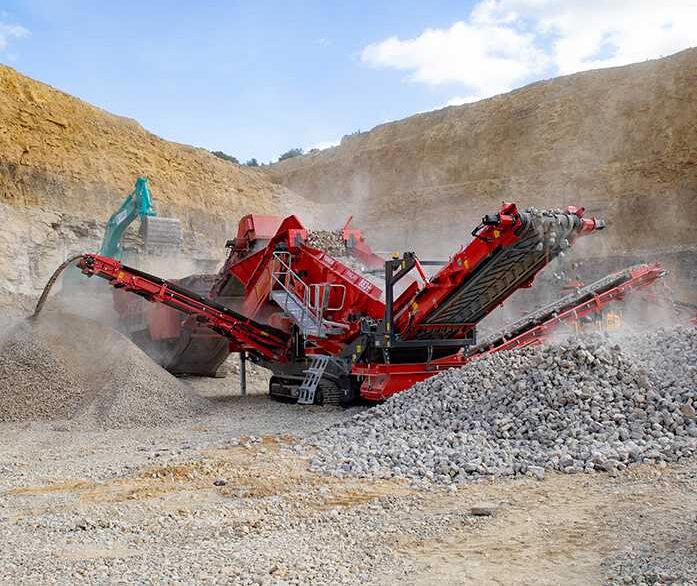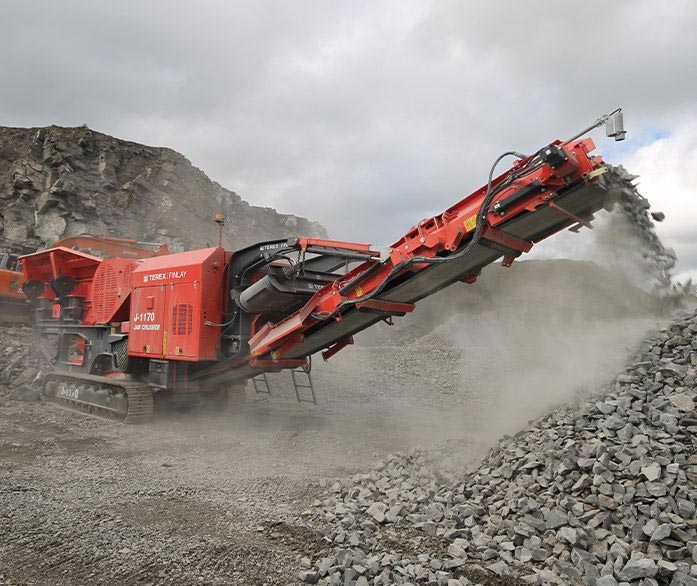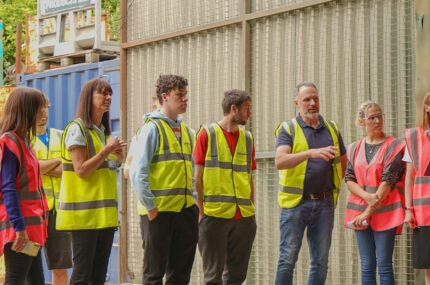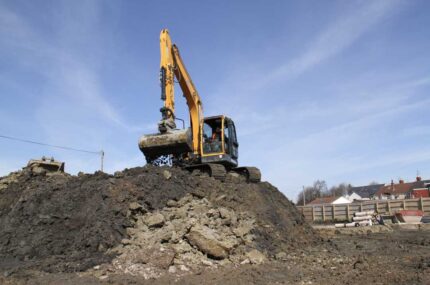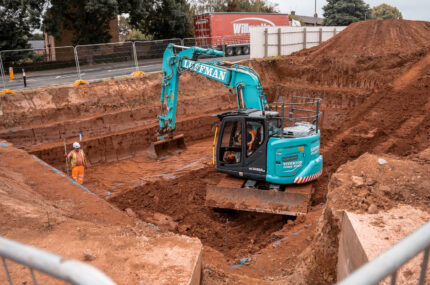GR Plant have built themselves an enviable reputation across the UK for delivering a variety of crushing and screening services, largely for the construction and demolition industries. Working on Hinkley Point C for nearly a decade, and Cardiff Steelworks for even longer, GR Plant specialise in recycling and processing materials for new purposes. Built out of owner Gareth Rees’s passion for cycling, the company has also successfully delivered numerous high profile mountain bike trails, including Lee Valley Velopark at the Queen Elizabeth Olympic Park in London. Since starting out in 1989 with a Ford H45 at the age of 22, Gareth has grown the business into a multi-faceted operation with a fleet of 50 machines and a staff of 20, and is celebrating the company’s 35th anniversary this year.
One of the company’s largest contracts is at Celsa Steelworks in Cardiff, where the company undertakes the recycling of steel-production waste materials, recovering any metals before resizing slag for reuse in construction projects.
The expansion of the company to undertake this work has seen a massive investment in purchasing the right kit to do the job. One they have undertaken hand in hand with Avonmouth based, Molson Group, who have supplied everything from Sennebogen material handlers to Finlay screens and crushers.
Sitting on the banks of the Taff in Cardiff, Celsa Steelworks is one of the UK’s largest producers of steel reinforcement products delivering over 1.2 million tonnes of material to the UK and Irish markets annually. The enormous electric arc furnace at the state-of-the-art plant handles thousands of tonnes of steel on a daily basis and ends up producing huge quantities of arc furnace and pit waste. This waste has traditionally been sent to landfill as it is a mixture of lime, steel, and other aggregates from the steelmaking process. Like any typical steel making process, elements are mixed according to the precise requirements of the steel and once melted, the remaining slag is taken from the mill and transferred to a tip site where, at 800°c it will sit being turned on a regular basis until it comes down to a more manageable 80°c.
With the company’s desire to explore sustainable options, recycling alternatives have been explored and instigated by GR Plant. Working with Swansea-based GR Plant and other providers, Celsa has built a system that can take the waste material from the production process and recycle it almost entirely.
“The job calls for a range of machinery not only capable of dealing with the excessive temperatures in the material, but also its abrasive qualities.” Contracts Manager Rob Jones explains. “When we won the contract, we quickly realised this and needed to ensure that future purchases were of the quality and durability we needed to ensure we could produce the right grade and right quantities of the finished material our client required.”
With over 25,000 tonnes of furnace residue handled annually, GR Plant wanted the backing of a machinery provider who would not only supply them with a range of equipment designed to do the job, but also one who would ensure their targets are achievable by making sure the kit kept running.
“We sat down with the team from Molson in the early days to discuss what we were being asked to do on the site.” Rob explains. “We quickly found the experience of the team at Avonmouth to be extremely helpful in developing the machinery to handle the highly abrasive material. We wanted assurances that the kit that they were specifying would do the job and manage the process and whilst some of the early trials with screens and crushers proved to be challenging, not once did Molson back away from us.”
The company has two separate parts of the steel making and recycling process to handle and have put a fleet of 17m capacity Sennebogen material handlers to work sorting and loading incoming scrap metals ready for the electric arc furnaces. Whilst this is a pretty standard job for the 36 tonne material handlers to undertake, there is a need for the machines to work around the clock as the steel making process, once started, only stops for maintenance and breakdowns. “The Sennebogens have been reliable machines for us.” Rob explains. “They have done exactly what we expected them to do and if there has been an issue, Molson have always been on hand to respond quickly.”
Moving on to the back end of the recycling operation and once the slag has sufficiently cooled, it is stockpiled allowing it to be pre-screened prior to the final crushing and screening operation. A pair of wheel loaders play a key role in the management of the material both pre and post processing.Like the Sennebogen material handlers, these wheeled loaders keep the back-end operations running. Moving the material from process to process could be undertaken with a tracked excavator and truck but with the material and processing points spread apart, the wheeled loader, working a load and carry system, is seen as the most efficient process.
The cooled slag is first passed over heavily-modified Finlay screens from the 595 range. Modifications include a reinforced and lined hopper, upgraded rip-stop belts, additional magnets, and protective plates to the external sides of the hopper to prevent potential damage to the machine. These modifications to the Finlay screens have been undertaken as the slag contains large quantities of metals left over from the steel making process. A 125mm hexagonal punch plate has been installed over the grizzly bars on the hopper to try and divert as much steel from entering the screen deck itself. Metal coming off the magnet and grizzly falls to the floor where one of the five Sennebogen material handlers sifts through it with a magnet before depositing it on the side. This material is then transferred to the other Sennebogens where it is sheared and set aside to re-enter the steel making process.
The material coming from the Finlay screener is then moved to the second stage in the process where it is crushed and screened. Site Foreman, Kevin Norton takes up the story; “Over the years we have used a variety of crushing and screening equipment to get the right size and cleanliness of material. This train we are running now does exactly what we want and can produce a steady quantity of material so long as what we feed in isn’t too wet!”
The processing plant employed by Gareth’s team consists of an excavator loading Finlay 883+ screener producing three products. Oversized material from the screen is fed back into a Finlay J1170 jaw crusher, which reduces it down to size before putting it back into the screen. Using this process, GR Plant can produce a variety of sized products to the clients specification. In addition to the 883 scalping screener, GR Plant uses two Terex Ecotec TTS 620T trommels, especially during the winter months when material becomes sticky. The trommel screens are efficient in extracting excessive dust when clean materials are required.
Whilst GR Plant are not contracted to produce a minimum tonnage of material per week, Kevin and his team have to ensure that the incoming material is handled as quickly as possible. “We need a reliable fleet of machines and Molson has been able to supply us just that. On the rare occasions we have had an issue, they have responded very quickly to our call. The kit here takes a fair beating but has stood up to the test. We do tend to change some of the machines sooner than we would normally, due to the work we do.” He commented. Rob is also very pleased with the service and back up they get from Molson. “We do have our issues occasionally, but overall, they are a great company to deal with. We ask them to supply at our specification and they do just that. They look after us from a service point of view even though they know the pain we put the machines through. They are a very fair and open company to deal with and one will continue to do so going forward.”
Working closely with the Molson team to develop an efficient material handling and recycling process has worked well for the GR Plant team. “Having Molson as a single source solution to all of our material handling and recycling applications on site has made our operation run efficiently and smoothly at Celsa.” Rob commented. “Whatever our issues are, we know it’s a single call or email to get it sorted. We know that when we are looking to upgrade a piece of kit, Molson knows what our requirements are. Having the support of the Molson team behind us has allowed us to develop ourselves as a company and has allowed us to explore projects which at one time wouldn’t have been on our radar.”



